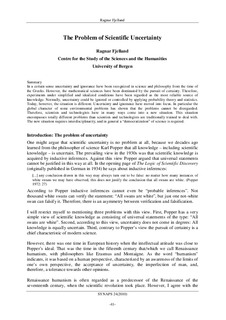| dc.description.abstract | In a certain sense uncertainty and ignorance have been recognized in science and philosophy from the time of
the Greeks. However, the mathematical sciences have been dominated by the pursuit of certainty. Therefore,
experiments under simplified and idealized conditions have been regarded as the most reliable source of
knowledge. Normally, uncertainty could be ignored or controlled by applying probability theory and statistics.
Today, however, the situation is different. Uncertainty and ignorance have moved into focus. In particular the
global character of some environmental problems has shown that the problems cannot be disregarded.
Therefore, scientists and technologists have in many ways come into a new situation. This situation
encompasses totally different problems than scientists and technologists are traditionally trained to deal with.
The new situation requires interdisciplinarity, and in general a “democratization” of science is required. | nb_NO |
